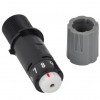Hello, Nadine here with a tutorial for making paint stencils with your Silhouette.
We moved house recently went for a duck-egg and grey bedroom. I bought some upcycled drawers and then painted a bargain retro dressing table that I found for sale a couple of streets away with the same paint the lady used for the drawers. I had lots of paint left over, so decided to paint a tray and have a go at stencilling. As the tray will be used for my makeup, my stencil says ‘Never ask a girl with winged eyeliner why she is late’ let's just say I'd be late for my own funeral!
Last week I showed you how to convert any font into a stencil version so that you don’t lose the internal circles and loops. In this tutorial, I use the free font called Stencil Silhouette UK that I shared in the tutorial that you can download from here. I’ve included the eyeliner quote as a Silhouette Compatible file in the download for ease.
What you’ll need
- Silhouette
- Stencil Design –Download here
- Item to be stencilled
- Paint
- Stencil material – paper, card or acetate
- Optional - repositionable glue
STEP ONE: Background Paint
Prepare your item to be stencilled by painting the background colour. Chalk or milk paints are a great choice as they don’t need to be primed. For a really nice finish, patch any dents with a little wood filler and sand back, I find a little effort here really reaps rewards later. My tray was only a few months old, so I just gave a light buff and painted 3 light coats. Don’t worry if your first coat looks dreadful, it’ll all come good in the next one!
STEP TWO: Cut Stencil
While your paint is drying, download the font and make your own phrase or download and open the eyeliner one from within Silhouette Studio. For the stencil material, a wide range of options can work. I used a thick paper, but if you’d like to reuse it, card or acetate would also work well.
If you have some repositionable glue, apply to the back as it will hold your stencil in place and help give a more crisp edge. A sticker paper that has a light hold, similar to a post-it note or washi tape would be perfect as then you don’t need the glue.
STEP THREE: Position
Align and position your stencil on your piece. I cut the border of my stencil to match the dimensions of the tray, so this part was extra easy.
STEP FOUR: Paint Stencil
I used a grey matte spray paint as I find this is the best way to get a crisp edge. Put newspaper down to protect the rest of your piece and the surrounding area and spray in a well ventilated area - ideally outside.
If you’d rather use regular paint use an almost dry brush and dab straight down.
Top tip
To prevent paint bleeding under the stencil, paint the first layer in the same colour as the background, or with a PVA/ mod podge. Any bleeding that occurs will not be noticed as it is the same colour. Continue the next layers with the stencil colour as normal.
STEP FIVE: Varnish
I used a matte top coat to seal and protect the tray.FINISHED PRODUCT
 |
| Close up - Crisp edges with no bleeding |
DESIGNS USED:
FREE Silhouette Compatible FilePRODUCTS USED:
 |
 |
 |








You achieved beautiful crisp edges Nadine - its a lovely project.
ReplyDeleteYes, what a lovely project, and the stencil lines are immaculate!
ReplyDeleteHi. Thanks. So, when you painted the stencil on, first you "painted" a layer with mod podge and then a layer of the darker paint color? Or did you modpodge over the whole painted tray and then put down the stencil and paint the stencil?
ReplyDeleteHi Aden, I actually used spray paint as I think this gives the best effect. The tip was for if you'd rather use ordinary paint. The mod lodge or same colour would be the first layer with the stencil in place. I hope this helps, Nadine
Delete